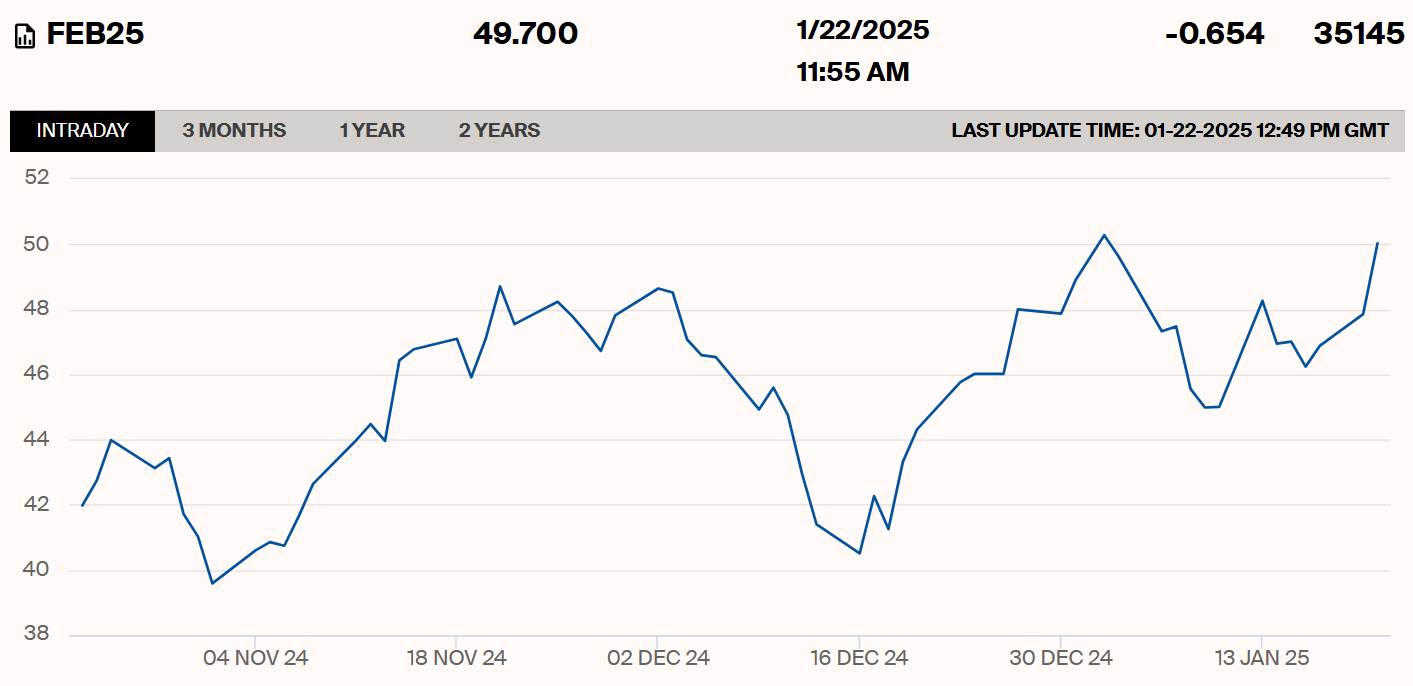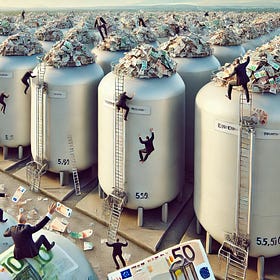Germany bites the gas storage bullet
HOT TAKE: TTF surges above €50/MWh on Berlin’s new storage subsidy mechanism
Never underestimate the ability of German bureaucrats to find a way to make an impossibly bad situation even worse.
German gas market operator Trading Hub Europe (THE) unveiled a subsidy mechanism on Tuesday to ensure German gas storage facilities are full by 1 November.
The Germany-wide mechanism will operate as an auction in which gas suppliers offer volumes at a €/MWh price deemed to be economic for filling storage at current seasonal spreads. The offer price is compared with the actual summer-winter spread, and any shortfall is topped up by way of a subsidy payment to make the supplier whole.
Market reaction was instantaneous: Dutch TTF, the EU gas benchmark, surged above €50/MWh for the first time this year.

The market read the policy as a signal that gas suppliers will effectively buy spot gas at any price without forward hedging for winter withdrawal, because German taxpayers will pay the difference.
As a result, prompt TTF surged to a new 2025 high and the Winter 25-26 contract registered only marginal gains — propelling the (already heavily inverted) summer-winter seasonal spread well below -€3/MWh.
A restocking subsidy is precisely the sort of pitiful arrangement that Energy Flux flagged this week as necessary if the increasingly problematic EU gas refilling targets are to be achieved:
“Unless prompt TTF prices fall much further, storage operators would need to (a) wear the risk of financial shortfall, (b) ask the Commission to make them whole, or (c) simply not achieve the target and suffer the consequences — which, as explored last year, are not particularly severe.” — Energy Flux (New Year, Old Realities)
Granted, in this case it is Germany’s state-owned THE offering the subsidy rather than the Commission. But the point stands that the EU refilling targets were distorting the market to such an extent that bureaucrats felt a fresh distortion was the only rational course of action to achieve the desired outcome. Perish the thought of actually fixing the underlying problem.
This is a classic case of the medicine being worse than the disease. Germany’s ‘fix’ creates an even more acute problem for everyone else. On Monday, Energy Flux calculated the cost of EU-wide refilling to 90% could weigh in at a cool €32.4 billion if TTF averages €47/MWh over the summer months. With TTF now flirting with €50/MWh, the implied cost has edged close to €34 billion.
Moreover, the extremely inverted summer-winter spread makes this an even more loss-making exercise for refilling non-German gas storage facilities. If summer gas is bought at €49.50/MWh and hedged for winter withdrawal at €44.9/MWh, the implied loss just on the fuel procurement is in the region of €3 billion. Once you add in the cost of injection, storage and withdrawal, the loss would be even greater.
Other member states must be looking at this (excuse my German) komplette Scheißshow in dismay. They will either have to follow Germany’s lead and introduce their own gas storage subsidy, or throw in the towel and pass the buck to the Commission. There is no way they can expect storage operators to swallow implied refilling losses of this scale without some form of assistance.
The most pragmatic course of action — which stands precisely zero chance of being implemented — is for the European Commission to own this mess and overhaul its entire gas storage policy.
There is no shortage of smart alternatives to managing Europe’s invaluable gas storage assets. Simply reverting to a market-based approach would be better than enriching gas producers and traders at consumer/taxpayer expense to guarantee a security of supply that is no longer at risk.
An even better solution, as detailed in this newsletter last summer, would be to create a dedicated EU gas storage commission to set and manage dynamic refilling targets that take into account prevailing market conditions.
This ‘EU central gas bank’ would coordinate procurement across the EU rather than leaving it up to individual member states, which frequently compete for the same molecules during refilling season, driving up the price further.
Then, long term supply contracts could be awarded after competitive tenders at the EU aggregate level, with the obligation to quote a fixed price indexed to inflation. The lowest cost supplier wins the contract, and stocks are refilled to the desired level at the agreed price. As Antonio Volpin of McKinsey suggested at the time:
“This would deprive traders of the ‘buyer of last resort’ and the tenders might produce positively surprising results given the massive oversupply which is building up.”
But don’t hold your breath for anything remotely sensible being done to remedy this self-inflicted farce. EU Commissioners, either out of pride or ignorance, will stick to their rigid restocking targets in spite of the overwhelming mountain of evidence that it is doing more harm than good.
Brussels and EU member states will join Germany in forcing European taxpayers to pony up to meet the EU’s arbitrary and unnecessary targets, lining the pockets of gas producers, traders and investment funds along the way. Chalk it up as just another day of consumer bloodletting at the alter of regulatory compliance.
Seb Kennedy | Energy Flux | 22 January 2025
More from Energy Flux:
The storage-speculation nexus
The European Union has once again achieved its gas restocking target early. At an aggregate level, EU underground gas storage facilities reached 90% full this week, more than two months ahead of the 1 November deadline.
The storage-speculation nexus (part 2)
Anyone hoping that savvy EU regulators might step in to calm jittery European energy markets was sorely disappointed last week. The European Commission, in its infinite wisdom, introduced intermediate natural gas restocking targets that added fuel to the fire of bullish bravado raging in the winter gas market.
New Year, old realities
Well, that didn’t last long. The end of Russian gas transits through Ukraine triggered, as predicted, a brief sell-off in EU gas futures in the first trading sessions of 2025. But a fresh salvo of geopolitical headlines quickly reversed the losses, allowing the market to fixate on its next bullish pseudo-narrative.









Why wouldnt the spread diverge above any limit levels set by THE? In the end they want to secure injections no matter what
Could this be a move to pump up natural gas prices so companies become interested in bidding for LNG terminal capacity? State-owned LNG terminal operator Deutsche Energy Terminal didn’t get any bids in the latest marketing round but is gearing up for new auctions in February. Or is that too tinfoil-hat?